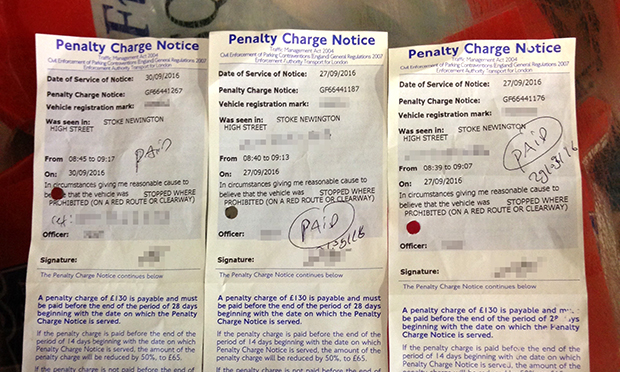Hackney Council defends parking scheme over rising surplus and ‘discrimination’ claims

Transport for London raked in £1m in three years from parking on Stoke Newington High Street. Photograph: Jamie Johnson
Hackney Council has defended its parking scheme after allegations from a Homerton resident that it is “discriminating” against polluting drivers and unlawfully raising profits through its rising surplus.
The surplus – the amount of income left over from parking charges after the scheme’s costs have been met – has steadily increased over the last five years, hitting £9.5 million in 2017/18.
It is one of the largest in the country, but the Town Hall say it is going up because more controlled parking zones are being introduced.
In 2013, a High Court judge ruled that Barnet Council had increased its parking charges illegally “in order to raise surplus revenue for other transport purposes”.
It was forced to pay back the money to residents, a group of whom initiated the legal action.
The use of a parking surplus is strictly governed by the 1984 Road Traffic Regulation Act.
A Hackney Council spokesperson said any extra cash raised through its parking scheme is spent “lawfully” on freedom passes for over-60s and the disabled, and the Citizen has seen no evidence to suggest otherwise.
But Homerton resident David Plows believes Hackney has questions to answer, and said he has been fighting for two years with a view to taking the council to court.
He said: “Thousands of drivers are being overcharged – particularly those using their cars for business.
“The Barnet judgement said councils cannot use their parking schemes to raise profits, and should only keep up with inflation.
“I want to take Hackney Council to court to find out whether it too, like Barnet, should pay back millions to residents in unlawful charges.”
The council’s parking prices are now based on emissions, whereas previously they had been defined by engine size.
Plows accused Town Hall policymakers of being “car haters”, adding: “This model of making parking free for electric cars is discrimination. It means people in polluting vehicles are effectively being used to pay for freedom passes.
“It seems as though the council just makes up the charges as they go along. Why is the surplus going up and up?”
The Town Hall spokesperson said: “The council has increased the number of controlled parking zones on streets across the borough to address residents’ concerns about commuter parking and to allow people to park near their homes.
“This means that more residents are buying parking permits.”

Cabinet member for transport Cllr Feryal Demirci. Photograph: Hackney Council
The council’s transport chief Cllr Feryal Demirci added: “We can’t increase the supply of parking, so need to control demand – parking charges are our tool for doing that.
“The use of any surplus is strictly governed by legislation – we use it on transport related schemes including concessionary fares for older people and residents with disabilities as well as works to the public realm to improve conditions for walking and cycling.
“We also work with car sharing companies to make sure that residents can get access to a car without having to own one.”
Hackney’s contribution to the Freedom Pass scheme, run by Transport for London, was £12.3 million in 2016/17.
When asked whether the council is considering any measures to reduce its parking surplus, Cllr Demirci said: “Two thirds of households in Hackney do not own a car, yet our public realm is dominated by vehicles which are responsible for dangerous levels of air pollution.
“So in Hackney, owners of diesel vehicles have to pay more for parking permits, but owners of electric cars can park free of charge.
“Most journeys in inner London can be easily walked, cycled or made by public transport, and through the revenue earned by parking charges we can make more improvements to help people give up their cars and choose more sustainable modes of transport.”
In March, Stoke Newington traders railed against Transport for London after it was revealed it had raked in over £1 million in parking charges on the high street in the last three years.
